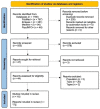Caregiving and Shared Decision Making in Breast and Prostate Cancer Patients: A Systematic Review
- PMID: 36661710
- PMCID: PMC9857468
- DOI: 10.3390/curroncol30010061
Caregiving and Shared Decision Making in Breast and Prostate Cancer Patients: A Systematic Review
Abstract
Background: A cancer diagnosis can impact patients' and caregivers' lives, posing different challenging situations. In particular, breast cancer and prostate cancer are two types of cancer involving families and especially spouses in challenges linked with the diagnosis and treatment process. Caregivers are usually involved in the treatment decision-making (TDM) process concerning patients' clinical pathway, cancer treatment, and ongoing therapies. To date, no contributions provide an exhaustive overview of the role of caregivers in cancer care and their involvement in the TDM process related to the therapies.
Methods: We performed a systematic review of caregiver and patients experiences and perceptions of caregiver involvement in cancer TDM. Articles were searched on Public/Publisher MEDLINE (PubMed), Excerpta Medica Database (Embase), Medical Literature Analysis and Retrieval System Online (Medline), and American Psychological Association APA PsycINFO.
Results: 17 studies were included, 10 on prostate cancer and 7 on breast cancer. According to the reviewed studies, patients and caregivers experienced the cancer diagnosis with a sense of unity. Most patients preferred to have an active or collaborative role with caregivers in TDM, feeling it was important to consult or share the decision made with their caregivers. Caregivers preferred to collaborate with patients or let patients decide by themselves after considering their opinions. Caregiver involvement could have a positive influence on the patient's medical decisions, even if cancer diagnosis and treatments overwhelmed patients and caregivers.
Conclusions: These findings highlight the importance of using a perspective that focuses on the relationship between a patient and caregivers when they receive a cancer diagnosis and have to make a treatment decision. Targeting caregiver-patient dyads, rather than individuals, is important since a supported relationship could have a protective effect on psychological distress, quality of life (QOL), and relationship satisfaction. Moreover, dyads may benefit from interventions that focus on the needs of both the patient and caregiver.
Keywords: breast cancer; caregivers; decision-making; prostate cancer.
Conflict of interest statement
The authors declare no conflict of interest.
Figures
Similar articles
-
How lived experiences of illness trajectories, burdens of treatment, and social inequalities shape service user and caregiver participation in health and social care: a theory-informed qualitative evidence synthesis.Health Soc Care Deliv Res. 2025 Jun;13(24):1-120. doi: 10.3310/HGTQ8159. Health Soc Care Deliv Res. 2025. PMID: 40548558
-
Decision aids for people facing health treatment or screening decisions.Cochrane Database Syst Rev. 2011 Oct 5;(10):CD001431. doi: 10.1002/14651858.CD001431.pub3. Cochrane Database Syst Rev. 2011. Update in: Cochrane Database Syst Rev. 2014 Jan 28;(1):CD001431. doi: 10.1002/14651858.CD001431.pub4. PMID: 21975733 Updated.
-
Shared decision-making interventions for people with mental health conditions.Cochrane Database Syst Rev. 2022 Nov 11;11(11):CD007297. doi: 10.1002/14651858.CD007297.pub3. Cochrane Database Syst Rev. 2022. PMID: 36367232 Free PMC article.
-
Shared decision-making for people with asthma.Cochrane Database Syst Rev. 2017 Oct 3;10(10):CD012330. doi: 10.1002/14651858.CD012330.pub2. Cochrane Database Syst Rev. 2017. PMID: 28972652 Free PMC article.
-
Parents' and informal caregivers' views and experiences of communication about routine childhood vaccination: a synthesis of qualitative evidence.Cochrane Database Syst Rev. 2017 Feb 7;2(2):CD011787. doi: 10.1002/14651858.CD011787.pub2. Cochrane Database Syst Rev. 2017. PMID: 28169420 Free PMC article.
Cited by
-
Factors Involved in Shared Decision-making Regarding Treatment Selection by Patients With Cancer.Cancer Diagn Progn. 2024 Jan 3;4(1):57-65. doi: 10.21873/cdp.10286. eCollection 2024 Jan-Feb. Cancer Diagn Progn. 2024. PMID: 38173669 Free PMC article.
-
The Risk Factors and Screening Uptake for Prostate Cancer: A Scoping Review.Healthcare (Basel). 2023 Oct 20;11(20):2780. doi: 10.3390/healthcare11202780. Healthcare (Basel). 2023. PMID: 37893854 Free PMC article.
-
Survivorship care for people affected by advanced or metastatic cancer: MASCC-ASCO standards and practice recommendations.Support Care Cancer. 2024 Apr 29;32(5):313. doi: 10.1007/s00520-024-08465-8. Support Care Cancer. 2024. PMID: 38679639 Free PMC article.
-
Preference for palliative care among low-income advanced cancer patients in Mainland China: a qualitative study.BMC Palliat Care. 2025 Apr 21;24(1):105. doi: 10.1186/s12904-025-01739-w. BMC Palliat Care. 2025. PMID: 40259291 Free PMC article.
-
Medication patterns and potentially inappropriate medication in patients with metastatic breast cancer: results of the BRE-BY-MED study.BMC Cancer. 2025 Jan 22;25(1):125. doi: 10.1186/s12885-025-13548-8. BMC Cancer. 2025. PMID: 39844089 Free PMC article.
References
-
- Minuchin S. Families and Family Therapy. Harvard University; Cambridge, MA, USA: 1974.



